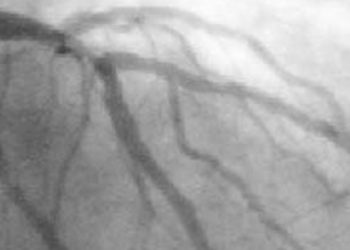Minimally invasive surgery provides functional benefit in acute supratentorial intracerebral hemorrhage
1. In this randomized controlled trial, patients who underwent minimally invasive surgical evacuation of a hematoma followed by medical management had lower disability scores than those who received medical management alone.
2. This effect was attributable primarily to intervention for lobar hemorrhages rather than hemorrhages in the basal ganglia.
Evidence Rating Level: 1 (Excellent)
Study Rundown: While evacuation of intracranial hematoma has many theoretical benefits, such as intracranial pressure reduction and secondary injury mitigation, randomized controlled trials of both conventional craniotomy and minimally invasive options have demonstrated largely mixed results concerning functional outcomes. However, questions remain surrounding patient selection, surgical technique, and optimal timing. This trial, titled Early Minimally Invasive Removal of Intracerebral Hemorrhage (ENRICH), investigated the safety and efficacy of prompt evacuation using a trans-sulcal parafascicular approach in patients with supratentorial hemorrhage. It was found that patients who received surgery in addition to medical management had shorter intensive care unit (ICU), hospital stays, and superior functional outcomes at the half-year mark compared to those who received medical management alone. Seizures, cerebral edema, and death were also all less frequent in the surgical group versus the control group. Of note, these differences persisted despite including those with anterior basal ganglia hemorrhages, a subgroup for which no surgical benefit was detected that comprised nearly one-third of the total study population. The primary limitation of this study was the strict enrollment criteria, which limited generalizability to patients who presented with hematomas of different volumes or in different locations. However, these results support the role of early, minimally invasive surgical management in patients with acute supratentorial intracerebral hemorrhage.
Click here to read the study in NEJM
In-Depth [randomized controlled trial]: The ENRICH trial involved 300 patients who had a spontaneous supratentorial hemorrhage associated with a hematoma volume of 30 to 80 ml and mild-to-severe neurologic deficits. Patients were assigned in a 1:1 ratio to receive either minimally invasive trans-sulcal parafascicular removal within 24 hours plus medical management or medical management alone. Patients with uncorrectable coagulopathy and hemorrhages with substantial thalamic or intraventricular extension were excluded. Further, while patients with anterior basal ganglia hemorrhages were initially included in enrollment, the pre-specified futility criterion for this subgroup was met during an interim analysis, and randomization subsequently became restricted to only those with hemorrhages in lobar locations. The primary efficacy endpoint was the score on the utility-weighted modified Rankin scale of symptom severity. In total, 92 of 300 patients (30.7%) had a hemorrhage in the anterior basal ganglia location, and 208 (69.3%) had a hemorrhage in the lobar location. The mean score on the Rankin scale at 180 days was 0.458 in the surgery group and 0.374 in the control group (difference, 0.084; 95% Bayesian Credible Interval [CI], 0.005 to 0.163). After application of a prespecified Bayesian hierarchical model with partial pooling, the between-group difference was −0.013 (95% CI, −0.147 to 0.116) among patients with anterior basal ganglia hemorrhage and 0.127 (95% CI, 0.035 to 0.219) among patients with lobar hemorrhage. The surgery group also had significantly shorter ICU stays (6.9 versus 9.7 days) and hospital stays (14.9 versus 18.1 days). Among patients in the surgery group, 9.3% had died by 30 days, and 4.7% died in the hospital after randomization; among patients in the control group, 18.0% had died by 30 days, and 12.7% died in the hospital. These findings suggest that early evacuation of intracerebral hemorrhages may yield superior functional outcomes compared to medical management alone.
Image: PD
©2024 2 Minute Medicine, Inc. All rights reserved. No works may be reproduced without expressed written consent from 2 Minute Medicine, Inc. Inquire about licensing here. No article should be construed as medical advice and is not intended as such by the authors or by 2 Minute Medicine, Inc.







